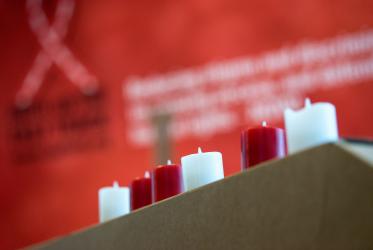“Having a sponsor.” “Prostitution.” “Rape.” Those are three among many grave issues that high school students face daily in Eastern Africa. Yet they have little or no safe space in which to share with adults or within churches.
Students at high schools in Nairobi, Kenya, and in Kakamega County, rural Kenya, spoke frankly to Rev. Pauline Wanjiru Njiru, World Council of Churches Ecumenical HIV and AIDS Initiatives and Advocacy (WCC-EHAIA) regional coordinator for Eastern Africa.
The students explained that a sponsor is a person who provides material things that a young person needs or wants in exchange for sex. For some young people, their families cannot provide basic needs such as menstrual pads, and the girls have to look for them. Sexual and gender-based violence in form of rape was also used by young boys to put girls down or “discipline” them if they were deemed “hard to get.”
Yet even in the context of HIV and AIDS, the issues that increase the vulnerability of young people are often not on the agenda of schools or the churches in charge of the schools. Schools appear preoccupied with academic performance while the churches have turned a deaf ear and blind eye to what is happening, Njiru reflected.
On 22 September, she met with students as part of a WCC-EHAIA strategy to accompany member churches in the schools they own or operate by providing safe spaces for students to receive adequate information about HIV and AIDS in terms of prevention and treatment. In doing this, the students are also able to discuss the difficult issues of sex and sexuality.
Njiru reckons that “the young people are game changers” given the African demographic that 65 percent of the population is 25 years or younger. “The church and the government must invest in young people especially in interventions geared towards curbing new HIV infections,” she said. “The young people have said in loud and clear terms that they are engaging in pre-marital sex, that their problem is not HIV but pregnancy, and that if pregnancy occurs they know how to deal with it! This is alarming information given that, in the region, many churches are still struggling to teach about condoms. Many church leaders continue to bury young girls who die from abortion complications and still campaign against the legalization of safe abortion.”
In the Kakamega School, Rev. Stephen Ndoria, minister in the Presbyterian Church of East Africa, said that the boys seemed unperturbed by the risks of HIV and AIDS and openly confessed to engaging in unprotected sexual intercourse. The boys didn't seem to be fully aware of the consequences and there was misplaced “heroism” if one slept with more girls.
The boys further claimed the girls make sexual advances in exchange for undeclared favors. It was shocking that rape wasn't seen as immoral or illegal but as a way of settling scores when a girl supposedly “insulted” boys and, according to the boys, it wasn't reported for fear of stigmatization on the part of the girl.
Peter Kang’ethe, a leader from the Greek Orthodox Patriarchate of Alexandria and All Africa, noted that some children were driven to sexual indulgence due to poverty. He was moved to buy school shoes for some of the students who attended the training. And he reckons that school diaconal ministries should be accompanied with scholarships to help the needy children.
Njiru reckons that all is not lost. “With increased resources, WCC-EHAIA has the capacity to develop training manuals and peer educators for greater impact in combating the spread of HIV among young people,” she said.
In Kenya, issues of young people come to the forefront (WCC feature of 19 October 2018)








